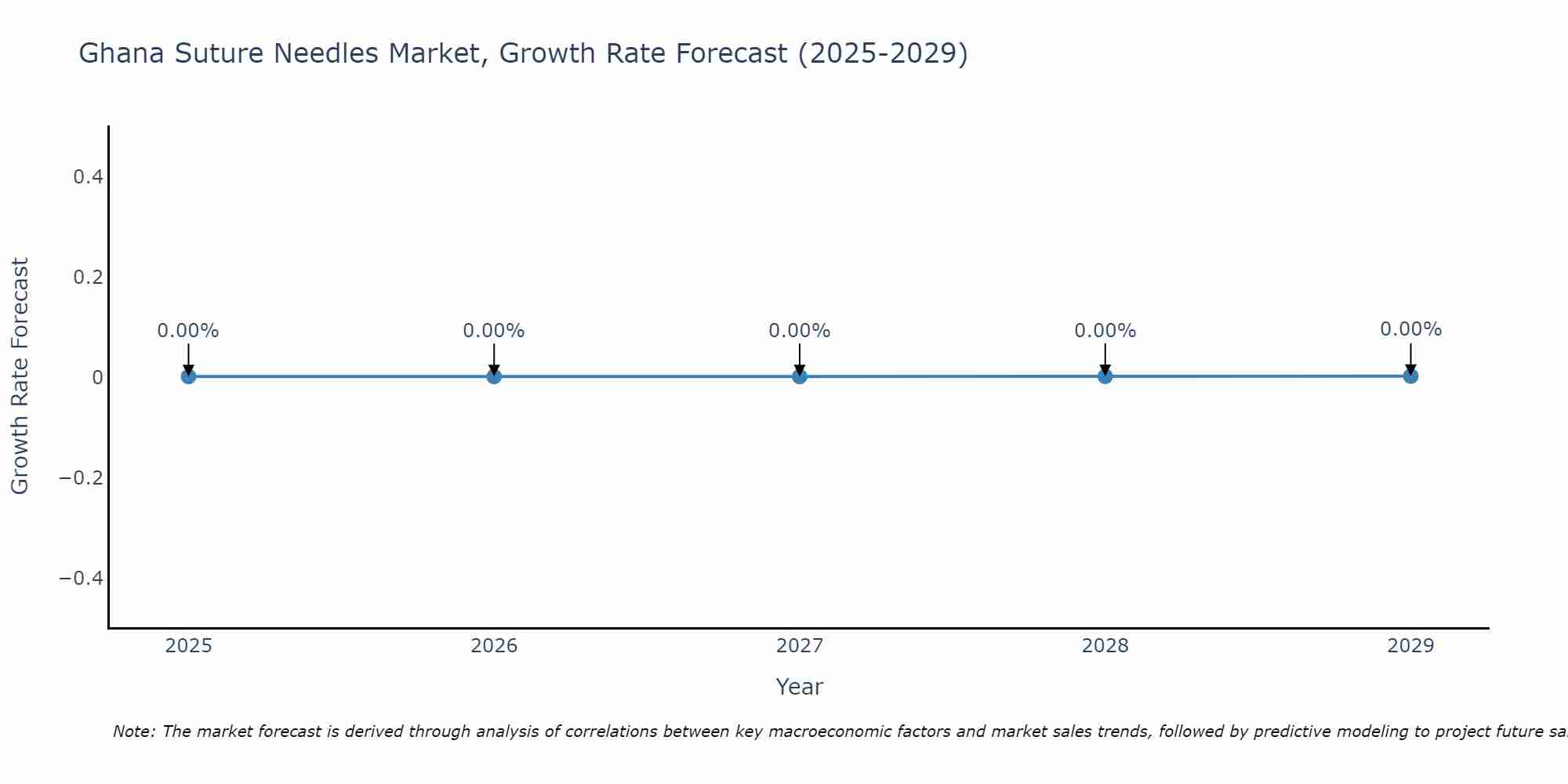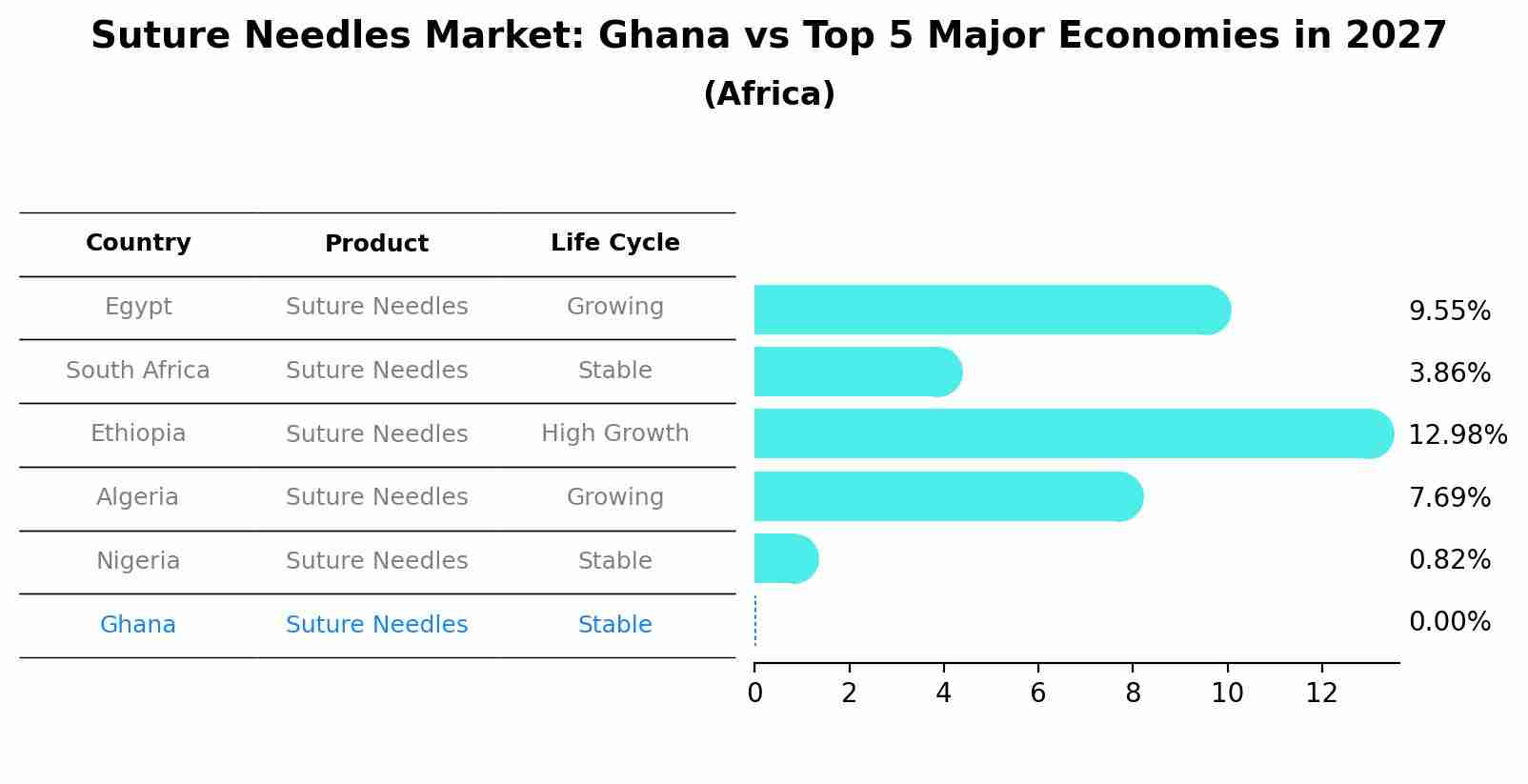Ghana Suture Needles Market (2025-2031) Outlook | Size, Analysis, Growth, Companies, Forecast, Value, Revenue, Industry, Trends & Share
| Product Code: ETC369836 | Publication Date: Aug 2022 | Updated Date: Jul 2025 | Product Type: Market Research Report | |
| Publisher: 6Wresearch | Author: Sachin Kumar Rai | No. of Pages: 75 | No. of Figures: 35 | No. of Tables: 20 |
Ghana Suture Needles Market Size Growth Rate
The Ghana Suture Needles Market is likely to experience consistent growth rate gains over the period 2025 to 2029. From 0.00% in 2025, the growth rate steadily ascends to 0.00% in 2029.

Suture Needles Market: Ghana vs Top 5 Major Economies in 2027 (Africa)
By 2027, the Suture Needles market in Ghana is anticipated to reach a growth rate of 0.00%, as part of an increasingly competitive Africa region, where Egypt remains at the forefront, supported by South Africa, Ethiopia, Algeria and Nigeria, driving innovations and market adoption across sectors.

Ghana Suture Needles Market Synopsis
The Ghana suture needles market is experiencing steady growth driven by factors such as increasing surgical procedures, rising prevalence of chronic diseases, and growing demand for advanced medical devices. The market is characterized by the presence of both domestic and international manufacturers offering a wide range of suture needles to cater to the diverse needs of healthcare providers. Factors such as technological advancements in suture needle design, increasing investments in healthcare infrastructure, and a growing focus on quality healthcare services are expected to further drive market growth in Ghana. Key players in the market are focusing on product innovation, strategic partnerships, and geographical expansion to strengthen their market presence and gain a competitive edge in the Ghanaian healthcare sector.
Ghana Suture Needles Market Trends
In the Ghana suture needles market, there is a growing demand for advanced technology and innovative designs that enhance precision and efficiency in surgical procedures. Manufacturers are focusing on producing suture needles with improved strength, sharpness, and biocompatibility to ensure better patient outcomes and reduced risk of complications. Additionally, there is a trend towards the development of disposable and safety-engineered suture needles to address concerns about infection control and needlestick injuries among healthcare professionals. The market is also witnessing an increasing preference for synthetic and absorbable materials in suture needles, driven by the benefits of reduced tissue reaction and improved wound healing. Overall, the Ghana suture needles market is evolving towards products that offer superior performance, safety, and patient comfort.
Ghana Suture Needles Market Challenges
In the Ghana suture needles market, some of the key challenges include limited access to advanced medical technology and products, leading to a reliance on traditional and potentially outdated suture needle options. Additionally, there may be issues with product quality and consistency, as well as concerns around affordability and availability of suture needles for healthcare facilities and providers in remote or underserved areas. Regulatory hurdles and import restrictions can also pose barriers to accessing a diverse range of suture needle options in the market. Overall, improving infrastructure, enhancing distribution networks, increasing awareness about the importance of quality suture needles, and addressing regulatory challenges are crucial steps to overcome these obstacles and foster growth in the Ghana suture needles market.
Ghana Suture Needles Market Investment Opportunities
The Ghana suture needles market presents promising investment opportunities due to the increasing healthcare infrastructure developments, growing demand for surgical procedures, and rising awareness about the importance of healthcare. Investors can consider opportunities in manufacturing and distribution of suture needles to cater to the expanding healthcare sector in Ghana. Additionally, collaborations with local hospitals and healthcare facilities can provide a strong market entry strategy. With the government`s focus on improving healthcare services and the rising disposable income levels, the demand for high-quality medical devices including suture needles is expected to rise, making it an attractive investment option for those looking to tap into the healthcare industry in Ghana.
Jordan Agar Market Government Policies
The Ghanaian government has implemented regulations and policies to ensure the safety and quality of suture needles in the market. The Food and Drugs Authority (FDA) of Ghana oversees the registration and approval of medical devices, including suture needles, to ensure they meet safety and efficacy standards. Importers and manufacturers must adhere to strict guidelines set by the FDA to market their products in Ghana. Additionally, the government has implemented import regulations to control the entry of substandard or counterfeit suture needles into the country, protecting consumers from potential harm. These policies aim to promote a competitive and transparent market for suture needles in Ghana, ensuring that healthcare providers have access to safe and effective medical devices for patient care.
Ghana Suture Needles Market Future Outlook
The Ghana suture needles market is expected to witness steady growth in the coming years due to the increasing number of surgeries being performed in the country, driven by factors such as a growing aging population and improving healthcare infrastructure. The demand for suture needles is likely to be fueled by advancements in surgical techniques, rising prevalence of chronic diseases, and expanding access to healthcare services. Additionally, the emphasis on infection control measures and the shift towards minimally invasive procedures are expected to drive the adoption of high-quality suture needles in Ghana. Market players are anticipated to focus on product innovation, strategic collaborations, and geographical expansion to capitalize on the emerging opportunities in the Ghana suture needles market.
Key Highlights of the Report:
- Ghana Suture Needles Market Outlook
- Market Size of Ghana Suture Needles Market, 2024
- Forecast of Ghana Suture Needles Market, 2031
- Historical Data and Forecast of Ghana Suture Needles Revenues & Volume for the Period 2021 - 2031
- Ghana Suture Needles Market Trend Evolution
- Ghana Suture Needles Market Drivers and Challenges
- Ghana Suture Needles Price Trends
- Ghana Suture Needles Porter's Five Forces
- Ghana Suture Needles Industry Life Cycle
- Historical Data and Forecast of Ghana Suture Needles Market Revenues & Volume By Type for the Period 2021 - 2031
- Historical Data and Forecast of Ghana Suture Needles Market Revenues & Volume By Round Bodied Needle for the Period 2021 - 2031
- Historical Data and Forecast of Ghana Suture Needles Market Revenues & Volume By Blunt Point Needle for the Period 2021 - 2031
- Historical Data and Forecast of Ghana Suture Needles Market Revenues & Volume By Reverse Cutting Needle for the Period 2021 - 2031
- Historical Data and Forecast of Ghana Suture Needles Market Revenues & Volume By Conventional Cutting Needle for the Period 2021 - 2031
- Historical Data and Forecast of Ghana Suture Needles Market Revenues & Volume By Spatula Needle for the Period 2021 - 2031
- Historical Data and Forecast of Ghana Suture Needles Market Revenues & Volume By Tapercut Needle for the Period 2021 - 2031
- Historical Data and Forecast of Ghana Suture Needles Market Revenues & Volume By Application for the Period 2021 - 2031
- Historical Data and Forecast of Ghana Suture Needles Market Revenues & Volume By Hospital for the Period 2021 - 2031
- Historical Data and Forecast of Ghana Suture Needles Market Revenues & Volume By Clinics for the Period 2021 - 2031
- Historical Data and Forecast of Ghana Suture Needles Market Revenues & Volume By Ambulatory Surgical Centres for the Period 2021 - 2031
- Historical Data and Forecast of Ghana Suture Needles Market Revenues & Volume By Others for the Period 2021 - 2031
- Ghana Suture Needles Import Export Trade Statistics
- Market Opportunity Assessment By Type
- Market Opportunity Assessment By Application
- Ghana Suture Needles Top Companies Market Share
- Ghana Suture Needles Competitive Benchmarking By Technical and Operational Parameters
- Ghana Suture Needles Company Profiles
- Ghana Suture Needles Key Strategic Recommendations
Frequently Asked Questions About the Market Study (FAQs):
- Single User License$ 1,995
- Department License$ 2,400
- Site License$ 3,120
- Global License$ 3,795
Search
Related Reports
- ASEAN Bearings Market (2025-2031) | Strategy, Consumer Insights, Analysis, Investment Trends, Opportunities, Growth, Size, Share, Industry, Revenue, Segments, Value, Segmentation, Supply, Forecast, Restraints, Outlook, Competition, Drivers, Trends, Demand, Pricing Analysis, Competitive, Strategic Insights, Companies, Challenges
- Europe Flooring Market (2025-2031) | Outlook, Share, Industry, Trends, Forecast, Companies, Revenue, Size, Analysis, Growth & Value
- Saudi Arabia Manlift Market (2025-2031) | Outlook, Size, Growth, Trends, Companies, Industry, Revenue, Value, Share, Forecast & Analysis
- Uganda Excavator, Crane, and Wheel Loaders Market (2025-2031) | Strategy, Consumer Insights, Analysis, Investment Trends, Opportunities, Growth, Size, Share, Industry, Revenue, Segments, Value, Segmentation, Supply, Forecast, Restraints, Outlook, Competition, Drivers, Trends, Demand, Pricing Analysis, Competitive, Strategic Insights, Companies, Challenges
- Rwanda Excavator, Crane, and Wheel Loaders Market (2025-2031) | Strategy, Consumer Insights, Analysis, Investment Trends, Opportunities, Growth, Size, Share, Industry, Revenue, Segments, Value, Segmentation, Supply, Forecast, Restraints, Outlook, Competition, Drivers, Trends, Demand, Pricing Analysis, Competitive, Strategic Insights, Companies, Challenges
- Kenya Excavator, Crane, and Wheel Loaders Market (2025-2031) | Strategy, Consumer Insights, Analysis, Investment Trends, Opportunities, Growth, Size, Share, Industry, Revenue, Segments, Value, Segmentation, Supply, Forecast, Restraints, Outlook, Competition, Drivers, Trends, Demand, Pricing Analysis, Competitive, Strategic Insights, Companies, Challenges
- Angola Excavator, Crane, and Wheel Loaders Market (2025-2031) | Strategy, Consumer Insights, Analysis, Investment Trends, Opportunities, Growth, Size, Share, Industry, Revenue, Segments, Value, Segmentation, Supply, Forecast, Restraints, Outlook, Competition, Drivers, Trends, Demand, Pricing Analysis, Competitive, Strategic Insights, Companies, Challenges
- Israel Intelligent Transport System Market (2025-2031) | Strategy, Consumer Insights, Analysis, Investment Trends, Opportunities, Growth, Size, Share, Industry, Revenue, Segments, Value, Segmentation, Supply, Forecast, Restraints, Outlook, Competition, Drivers, Trends, Demand, Pricing Analysis, Competitive, Strategic Insights, Companies, Challenges
- Uganda Precast and Aggregate Market (2025-2031) | Strategy, Consumer Insights, Analysis, Investment Trends, Opportunities, Growth, Size, Share, Industry, Revenue, Segments, Value, Segmentation, Supply, Forecast, Restraints, Outlook, Competition, Drivers, Trends, Demand, Pricing Analysis, Competitive, Strategic Insights, Companies, Challenges
- Australia IT Asset Disposal Market (2025-2031) | Strategy, Consumer Insights, Analysis, Investment Trends, Opportunities, Growth, Size, Share, Industry, Revenue, Segments, Value, Segmentation, Supply, Forecast, Restraints, Outlook, Competition, Drivers, Trends, Demand, Pricing Analysis, Competitive, Strategic Insights, Companies, Challenges
Industry Events and Analyst Meet
Our Clients
Whitepaper
- Middle East & Africa Commercial Security Market Click here to view more.
- Middle East & Africa Fire Safety Systems & Equipment Market Click here to view more.
- GCC Drone Market Click here to view more.
- Middle East Lighting Fixture Market Click here to view more.
- GCC Physical & Perimeter Security Market Click here to view more.
6WResearch In News
- Doha a strategic location for EV manufacturing hub: IPA Qatar
- Demand for luxury TVs surging in the GCC, says Samsung
- Empowering Growth: The Thriving Journey of Bangladesh’s Cable Industry
- Demand for luxury TVs surging in the GCC, says Samsung
- Video call with a traditional healer? Once unthinkable, it’s now common in South Africa
- Intelligent Buildings To Smooth GCC’s Path To Net Zero













